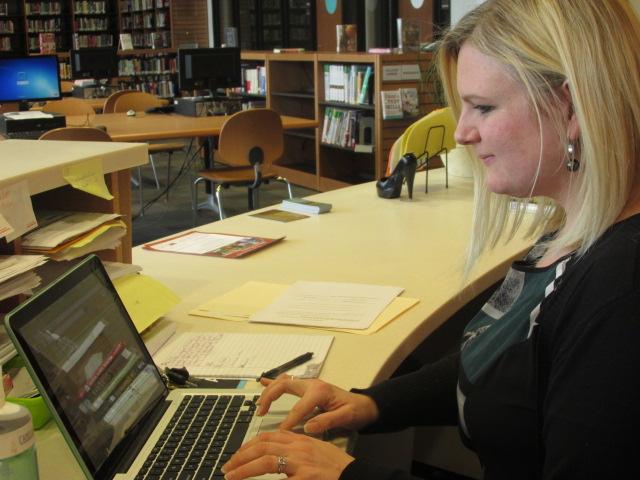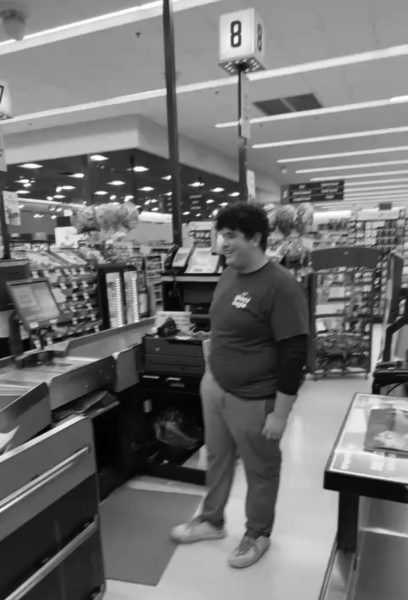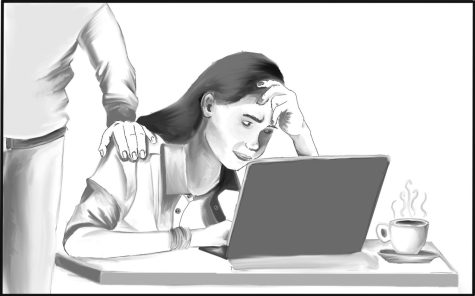Library Remains Vital in Electronic Age
This year BHS has added a spacious new library with large plate glass windows, quiet alcoves for study, computers for research, small rooms for meetings, printers and of course a plethora of books.
If you haven’t noticed the new library yet, it might be because your eyes are glued to the bright screen in your hand. Students today are more likely to seek answers on their phones than they are to use reference books.
School librarian and media specialist Jennifer Flaherty acknowledges the onslaught of digital information in our lives, and she strives to assist students in effectively using these new resources. According to Flaherty, libraries are changing as information becomes more accessible online.
“We want to teach people how to use that information to be most productive in society,” Flaherty said.
According to Flaherty, the BHS library has seen increased use as students seek assistance finding reliable resources.
The library has recently introduced innovative uses of technology to promote reading beyond school-assigned books.
Flaherty explained that through a recent grant, students are now able to check out books electronically through the OverDrive eBook program, an attempt to make reading more convenient.
At publication, one hundred eBooks have been checked out of the BHS library since the beginning of the 2013-2014 school year, showing growing use of technology as a supplement to the printed books offered by the library.
In addition to the emphasis on technology, librarians still promote literacy in more traditional ways. Flaherty does this by offering a book club, book talks in classes and adding displays of popular books in the windows.
Special education teacher Michele Toomey brings her students to the library for an activity dubbed “book speed dating,” allowing students to discuss books with each other for short intervals while being social and having fun.
Flaherty feels it is more difficult to encourage high school students to read compared to other age groups.
“It’s because the workload is harder. There’s not as much time between school work, sports, jobs and a social life,” she said.
Public librarians also work hard to get kids to spend more time reading. Joyce Bigam is children services coordinator at Cuyahoga Falls Library.
“Last year, 1,500 kids participated in reading programs [at this library],” Bigam said.
“The programs are different every summer,” she said. “Donations and coupons from local restaurants offer incentives for kids to read. Our smaller winter reading program also attracts around two hundred participants.”
Bigam fears that new technologies are bringing dramatic cultural change, and that young people are less likely to read books.
“Different age groups have different perceptions on the importance of libraries,” she said. “With the prevalence of technology, children have really lost touch with each other and with reading.”
Senior Varun Jambunath agrees that technology has changed his perspective on the significance of libraries.
“Given the vast amount of information easily accessible on the internet, I can see the need for libraries slowly diminishing,” he said.
However, Junior Ami Scherson utilizes the school library frequently to study during free periods, print papers and purchase coffee in the morning. Scherson believes the library has become more of a social place permeated by technology.
“I feel that the librarian knows about technology and is very nice. She is willing to help anyone,” wrote Scherson in an email.
Junior Griffin Celleghin sees a dramatic shift in the significance of librarians in modern society.
“I think the role of librarians has shifted from learning about books to learning about technology,” Celleghin said.
According to information provided by Flaherty, the number of books checked out from the BHS library has increased by four percent in the past two years. Many students are eager to ask for suggestions on what to read.
“I think libraries are still very important. Librarians can still be used as inside track on really good resources,” Bigam said.
“A lot of kids don’t appreciate the print aspect and they don’t understand the importance of the written word. You can’t do anything if you can’t read,” she said.
“It’s exciting and things are always changing,” Flaherty said. “But I love sharing literature and books with students. Whether the format is changing, their needs will always stay the same.”













